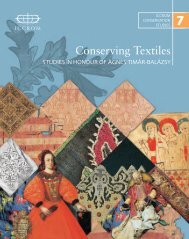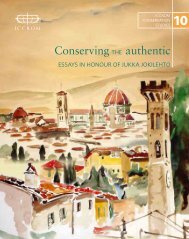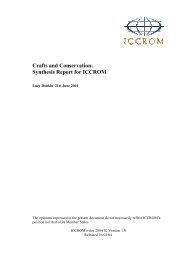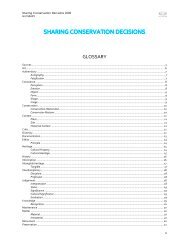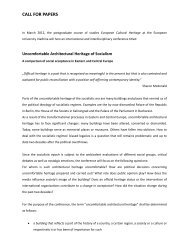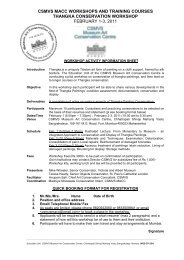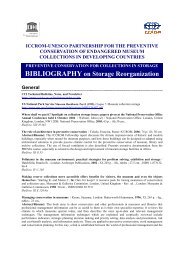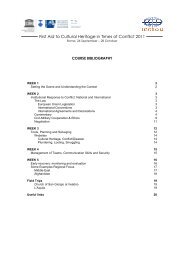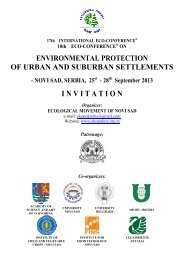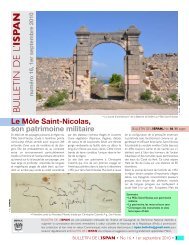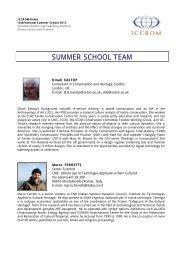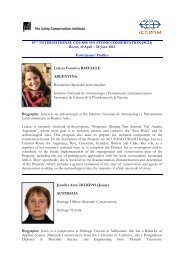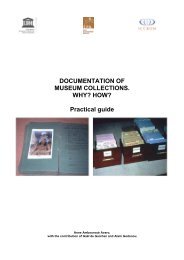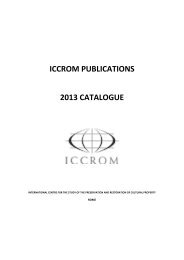Annual Report 2011 - Iccrom
Annual Report 2011 - Iccrom
Annual Report 2011 - Iccrom
You also want an ePaper? Increase the reach of your titles
YUMPU automatically turns print PDFs into web optimized ePapers that Google loves.
and recognition of the conservation<br />
profession. This year, ICCROM supported<br />
an important initiative of the European<br />
Confederation of Conservator-Restorers<br />
Organizations (ECCO) to improve the<br />
cultural heritage legislation framework in<br />
Europe and beyond.<br />
ECCO represents over 5,000 practicing<br />
conservator-restorers. It contributes to<br />
the safeguarding of cultural heritage<br />
in Europe through the development of<br />
common definitions and guidelines,<br />
and promotes the legal recognition of<br />
conservator-restorer professionals in<br />
various countries. This year, ECCO’s<br />
publication and adoption of a framework,<br />
Competences for Access to the<br />
Conservation-Restoration Profession,<br />
is a major step in this direction. Another<br />
challenge is the improvement of national<br />
laws regarding cultural heritage, which<br />
often lack quality control mechanisms for<br />
conservation and restoration activities.<br />
In order to advocate improvement<br />
in this area, ECCO has developed a<br />
proposal for a Recommendation on the<br />
Conservation-Restoration of Cultural<br />
Heritage, which was submitted to the<br />
Council of Europe in May <strong>2011</strong> with the<br />
support of ICCROM. The text provides a<br />
definition of conservation-restoration and<br />
outlines good practice in connection with<br />
the need for regulation and harmonization<br />
of access and exercise of the profession.<br />
The proposal was well received and is<br />
now being studied by the competent body<br />
for culture and cultural heritage at the<br />
Council of Europe.<br />
World Heritage<br />
In the past year, ICCROM has continued<br />
in its role as Advisory Body to the World<br />
Heritage Committee. A major achievement<br />
in <strong>2011</strong> was the finalization of World<br />
Heritage Capacity Building Strategy,<br />
which was formally presented to the<br />
35th Session of the World Heritage<br />
Committee in Paris in June. The strategy<br />
proposes two paradigm shifts. The first,<br />
a shift from training to capacity building,<br />
aims at strengthening the ability of<br />
heritage practitioners, institutions, and<br />
a broader range of stakeholders to<br />
conserve and manage heritage better.<br />
The second shift foresees a greater<br />
integration and collaboration between<br />
the cultural and natural heritage sectors<br />
in developing activities with a view<br />
of mutually benefiting each other. In<br />
addition, ICCROM implemented a number<br />
of training activities for World Heritage,<br />
including the preparation of an orientation<br />
session for members of the World<br />
Heritage Committee. This year also saw a<br />
number of Reactive Monitoring missions<br />
(India, Uganda, Sudan, Senegal), as<br />
well as ICCROM taking part in Periodic<br />
<strong>Report</strong>ing meetings in the Arab States<br />
(Algeria), sub-Saharan Africa (South<br />
Africa), Asia and the Pacific (India,<br />
Thailand, Sri Lanka), Latin America and<br />
the Caribbean (Mexico, Brazil, Barbados),<br />
and Europe (Czech Republic). ICCROM<br />
also worked closely with the two other<br />
Advisory Bodies to the Convention, IUCN<br />
and ICOMOS, and with the World Heritage<br />
Centre to prepare State of Conservation<br />
reports and other documentation for the<br />
Committee.<br />
ICCROM Newsletter 37: <strong>Annual</strong> <strong>Report</strong><br />
25



